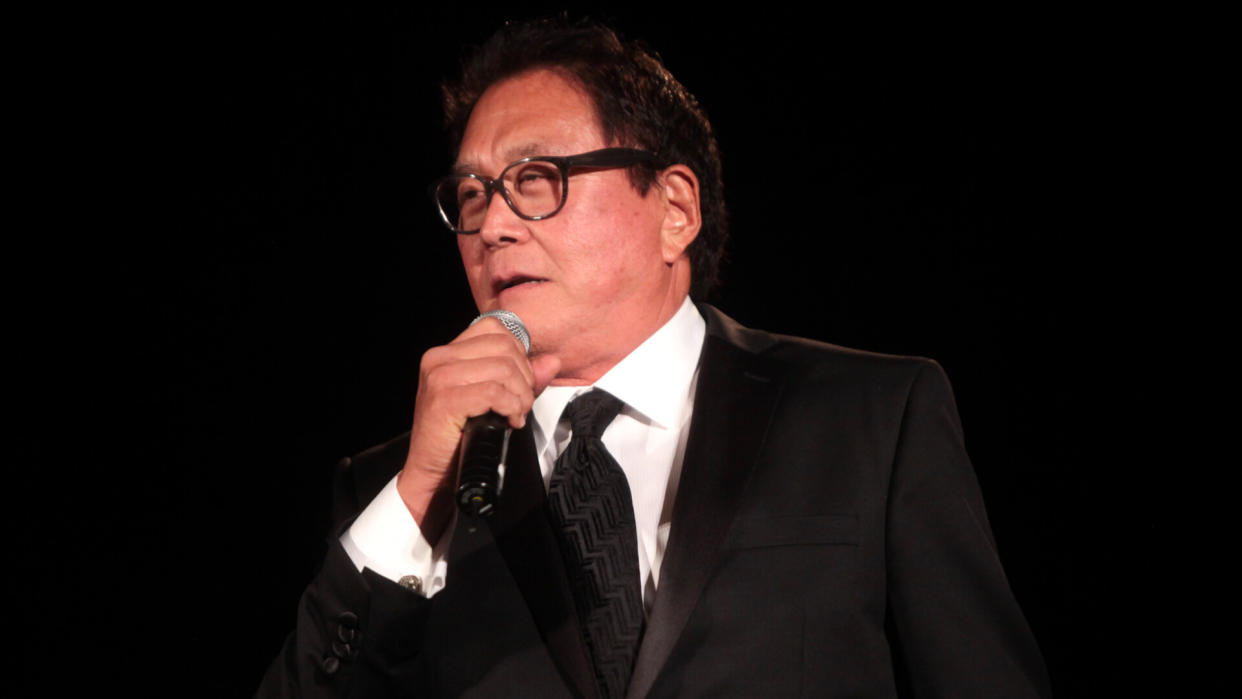Robert Kiyosaki: ‘6 Basic Words to Financial Literacy’

Robert Kiyosaki, the founder of the “Rich Dad, Poor Dad” empire, says that there are six basic words that are key to financial literacy and education: income, expense, asset, liability and cash flow. The last “key” is a combination of two words, making six total terms that Kiyosaki finds essential. Here’s a look at what each of these terms mean and why they’re so important to being financially literate.
Trending Now: Warren Buffett: 6 Best Pieces of Money Advice for the Middle Class
Read More: 5 Genius Things All Wealthy People Do With Their Money
Income
Understanding income is the cornerstone of financial literacy. Without income, there can be no financial planning. Income is the money that is paid to you from investments, your job or your business. In other words, income is the money you earn from all sources. Income is used to pay expenses and to invest.
For Kiyosaki, income is what puts you in the position of being truly wealthy. According to his site, Kiyosaki says you can’t be rich if you don’t develop a financial plan that provides consistent income in the future.
Try This: 7 Ways the Upper Middle Class Can Become Rich in 2024
Expense
Expenses are costs you pay for goods or services. Anything you spend money on can qualify as an expense. Necessary expenses are those that you have to pay in order to live. These include things like your rent or mortgage, your utility bills and your food. Discretionary expenses are those that you don’t truly need to survive but that you spend money on nonetheless, like eating out or traveling. Discretionary expenses are often referred to as “wants,” as opposed to the necessary expenses that are your “needs.”
Kiyosaki says that what’s important in terms of your personal finances is not what you earn but what you keep. It doesn’t matter if you earn a six-figure salary if you’re spending it all. This is why a person earning $50,000 per year can actually be much wealthier than someone earning $100,000 or more. To be financially literate, you need to understand that keeping your expenses under control by spending less than you earn is the key to long-term wealth, regardless of how much money you make.
Asset
An asset is anything that you own. This includes everything from your home (if applicable) to your jewelry, clothing, furniture, investments, cash, cars or appliances. When you use your income to buy something, whatever you buy becomes a personal asset of yours.
Assets are an important part of the net worth equation. Specifically, to determine your net worth, you’ll start with your assets and then subtract your liabilities. If you want to boost your net worth, increasing your assets is a key step.
Kiyosaki believes that a good way to build wealth is to continue to invest your income into assets that generate even more income. On his Youtube channel, he shared one of his favorite suggestions: To invest your income into rental real estate, which can generate instant cash flow on your investment.
Liability
A liability is something that you owe. Examples of liabilities are your home mortgage, your car payment and your credit card balance. Liabilities are subtracted from assets to determine your net worth. For example, if you own a home worth $400,000 but you still have $300,000 left on your mortgage, the true asset value of your home is just $100,000, or $400,000 minus $300,000.
For Kiyosaki, understanding the difference between assets and liabilities is a key part of being rich versus being poor. In the simplest terms, an asset puts money in your pocket, while a liability is something that takes money out of your pocket. Kiyosaki said the rich don’t work for income. Rather, they invest. According to a blog on Rich Dad, rich people’s assets, from stocks and bonds to real estate, do all the work of generating income and profits. This is something that billionaire Warren Buffett referred to when he famously said, “If you don’t find a way to make money while you sleep, you will work until you die.”
Cash Flow
Cash flow simply refers to the flow of money into and out of accounts. If you take in more money than you spend, you have positive cash flow, which is a good thing. In terms of investments, as mentioned on Rich Dad’s site, cash flow is the income stream you receive from an asset you purchase.
“Establishing consistent cash flow is how you’ll achieve financial independence,” Kiyosaki said.
He suggests that investors should focus more on cash flow than the amount of assets they acquire because the end game is to generate enough income to pay for all your expenses. Once you’ve reached that level, your time is freed up to do whatever you would like. Assets are important, as they generate the income that you use to cover your expenses. But at the end of the day, the reason why you’re accumulating assets is to generate enough positive and ongoing cash flow that you don’t have any financial concerns.
More From GOBankingRates
I'm a Shopping Expert: 9 Items I'd Never Put in My Grocery Cart
This is One of the Best Ways to Boost Your Retirement Savings in 2024
This article originally appeared on GOBankingRates.com: Robert Kiyosaki: ‘6 Basic Words to Financial Literacy’
